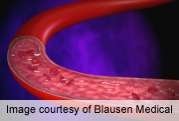Annual BP checks may improve hypertension identification

(HealthDay)—For previously normotensive adults, an annual office-based hypertension screening strategy is associated with improved specificity while maintaining sensitivity, according to a study published in the March/April issue of Annals of Family Medicine.
Gregory M. Garrison, M.D., and Sara Oberhelman, M.D., from the Mayo Clinic in Rochester, Minn., conducted a retrospective case-control study involving 372 adults without hypertension and 68 patients with newly diagnosed hypertension to assess the standard screening practice of checking blood pressure at every visit versus a strategy that considers only annual blood pressure measurements.
The researchers found that implementation of annual screening correlated with an improvement in specificity from 70.4 percent for the usual practice to 82.0 percent. The two methods were not significantly different with respect to sensitivity.
"Hypertension screening is an important part of preventive health care delivered by primary care physicians," the authors write. "This initial pilot study proposes an annual screening strategy for hypertension using the most common screening test, the office-based manual blood pressure measurement, which improves specificity while maintaining sensitivity."
More information:
Abstract
Full Text
Health News
Copyright © 2013




















